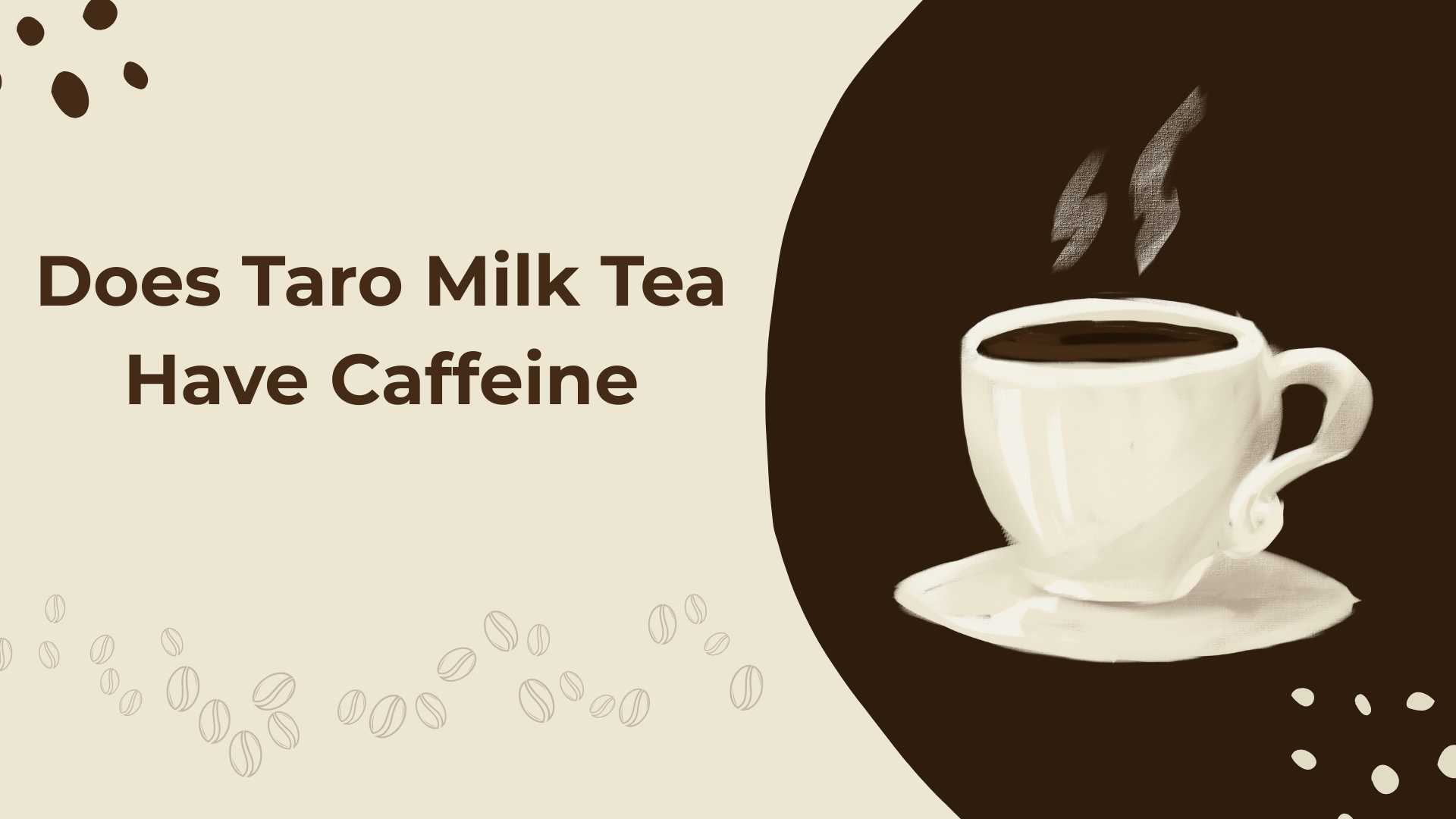Okay, so if you’ve ever stood in line at a bubble tea shop (and let’s be real, most of us have), you’ve probably noticed that taro milk tea is like, always on the menu. It’s that dreamy purple drink that tastes a little nutty, a little creamy, and honestly, kind of magical. But then you pause for a sec and wonder: does taro milk tea have caffeine? I mean, sure, it’s tea… but it tastes so smooth and dessert-y that you might not even think about the caffeine part. So if you’re trying to cut down on caffeine (or maybe you’re just curious), let’s dig into this whole taro tea situation and find out what’s really going on in that purple cup of joy.
Table of Contents
What Is Taro Milk Tea, Anyway?
Alright, let’s back up for a second. If you’re new to the world of bubble tea or milk tea, you might be wondering, “Wait, what is taro?” Totally fair question.
Taro is actually a root vegetable. Yep, a veggie! It kinda looks like a weird brown potato on the outside, but when you cook it, mash it, or blend it up—it turns this lovely lavender color and has a slightly sweet, nutty flavor. In a lot of Asian desserts and drinks, taro is a star ingredient. When it comes to milk tea, taro can either be used as a powder or a paste mixed with milk (dairy or non-dairy) and sometimes tea.
But here’s the key point—not all taro milk tea is made the same way.
So… Does Taro Milk Tea Have Caffeine?
Okay, back to the big question: does taro milk tea have caffeine?
Short answer: it depends.
Longer answer? Let’s break it down.
1. If It’s Made with Black or Green Tea – Then Yes, It Has Caffeine
Many bubble tea shops make taro milk tea using a base of black tea or green tea. If that’s the case, then yup—you’re getting caffeine in your drink. Black tea usually contains more caffeine than green tea, so it also depends on what the base is.
Here’s a quick comparison:
- Black tea-based taro milk tea: ~40–70mg of caffeine per 16 oz
- Green tea-based version: ~25–45mg per 16 oz
So if you’re trying to avoid caffeine completely, you’ll wanna ask the barista what kind of base they’re using.
2. If It’s Made with Just Taro Powder and Milk – Then Probably Not (or Very Little)
Here’s where things get interesting. Some taro milk tea drinks—especially the ones that come in powder form—don’t actually use tea at all. They might just mix taro-flavored powder (which sometimes doesn’t even have real taro, btw) with milk and ice. If that’s the case, there might be zero caffeine in your cup. Or maybe just a tiny bit, depending on the brand of powder.
So again, it all depends on how the drink is made.
Watch Out: Taro Powder Ingredients Can Be Sneaky
Here’s a weird (and kind of annoying) truth: some taro powders already contain tea extract. That means even if you think you’re just drinking a creamy, caffeine-free treat, you might actually be sipping on something with a little buzz.
Your best bet? Check the ingredients if you’re making it at home—or if you’re at a shop, just ask! Most bubble tea shops are used to caffeine questions and can tell you what’s in the mix.
How Much Caffeine Are We Talking About?
Let’s compare taro milk tea with a few common drinks just so you get a better idea:
| Drink | Approx. Caffeine (per 16 oz) |
|---|---|
| Taro milk tea (black tea base) | 40–70 mg |
| Taro milk tea (green tea base) | 25–45 mg |
| Taro milk tea (no tea) | 0–5 mg |
| Regular coffee | 95–150 mg |
| Green tea | 30–50 mg |
| Coca-Cola (12 oz) | 34 mg |
So as you can see, even if taro milk tea does have caffeine, it’s usually way less than a coffee.
Can You Order It Caffeine-Free?
Absolutely! Most shops let you customize your drink. If you want a caffeine-free version, just ask for it without the tea base. They’ll often make it using just taro powder and milk, which should be either caffeine-free or very low in caffeine.
Pro tip: you can also ask for it with decaf tea, but not all places offer that option.
Is Taro Milk Tea Good for You?
Well… it’s delicious. But is it healthy? That’s debatable.
Taro itself has some fiber and nutrients, but once it gets turned into a sugary, creamy drink with boba pearls—it leans more into dessert territory than “health drink.”
Plus, the taro powder used in many places often contains added sugar, food coloring, and artificial flavoring. So if you’re sipping it every day, maybe go easy or try making your own at home with real taro (it’s a bit more work, but definitely worth it if you’re trying to go clean!).
Conclusion
So, to circle back to our original question—does taro milk tea have caffeine?
- Yes, if it’s made with black or green tea.
- Probably not, if it’s just powder and milk.
- Maybe, if the powder contains tea extract.
Basically, if you’re super sensitive to caffeine or trying to cut back, don’t just assume taro milk tea is safe. Ask. Check the ingredients. Or better yet—make your own and control everything that goes in!
